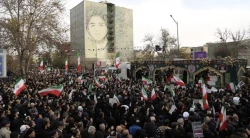South Africa's coronavirus lockdown: Doubts creep in
- 2020-05-12 19:13:45
 Pierre Rayer: Art, Science, and Happiness: The Universal Mission of Transmission to Future Generations through Patronage at the Louvre Abu Dhabi
Pierre Rayer: Art, Science, and Happiness: The Universal Mission of Transmission to Future Generations through Patronage at the Louvre Abu Dhabi Ahly crowned Super champions after dramatic extra-time win over Modern Future FC
Ahly crowned Super champions after dramatic extra-time win over Modern Future FC Yemeni Honey..A Development Wealth Threatened By Conflict And Climate Change
Yemeni Honey..A Development Wealth Threatened By Conflict And Climate Change Yemen: Hadrami Calls to Reject Claimed Representation in Riyadh Conference
Yemen: Hadrami Calls to Reject Claimed Representation in Riyadh Conference Yemen : British Investigations Reveal Al-Masirah TV Registered in London Under Formal Legal Cover
Yemen : British Investigations Reveal Al-Masirah TV Registered in London Under Formal Legal Cover King orders restructuring of Jordan Armed Forces
King orders restructuring of Jordan Armed Forces Adnoc Gas sees potential to advance Ruwais LNG commercial start
Adnoc Gas sees potential to advance Ruwais LNG commercial start Iran's protest death toll surpasses 5,000 amidst ongoing tensions
Iran's protest death toll surpasses 5,000 amidst ongoing tensions
